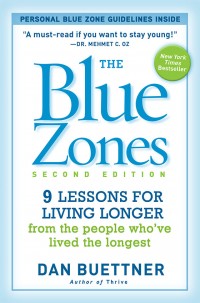
The front-cover blurb on this 2008 NYT bestseller by Dan Buettner is “A must-read if you want to stay young!” Based on that, you’d wonder why every person on the planet hasn’t bought or read The Blue Zones: 9 Lessons for Living Longer, since who doesn’t want to stay young?
The next best thing is to live to a ripe old age and in vibrant health right up until the end. Buettner travelled five “Blue Zones” around the world to study locations that have statistical proof of the extended longevity of many of its residents. They include Sardinia (Italy), Okinawa (Japan), Loma Linda (California), Nikoya (Costa Rica) and Ikaria (Greece.)
In the United States, there is only one centenarian (someone 100 years old or more) per 5,000 people. In the Sardinian “Blue Zone” they found seven centenarians in a single village of 2,500 people.
Fortunately, these Blue Zones often share common lifestyles that North Americans can emulate. Buettner — who originally visited the Blue Zones courtesy of National Geographic magazine — concludes with a chapter he titles Your Personal Blue Zone, providing nine major ways affluent and stressed out North Americans can emulate the lessons learned by the centenarians in the Blue Zones.
Create a pro-longevity environment in your own home: your personal Blue Zone





